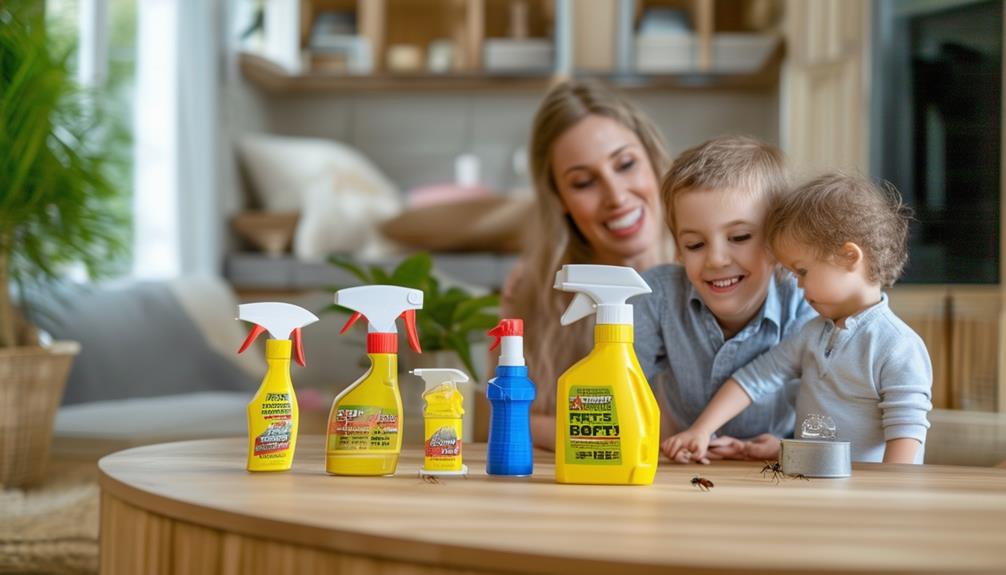Roaches, those pesky insects that can invade our homes and send shivers down our spines. We often find ourselves wondering, what is it that attracts these creatures to our living spaces? In order to understand the answer to this question, we must delve into the realm of roach behavior and biology.
Let us consider a hypothetical scenario: a family living in a cozy suburban home suddenly finds themselves faced with an unwelcome infestation of roaches. They are left pondering, ‘What is the number one thing that attracts roaches?’
To truly comprehend the allure of roaches, we must first examine their basic needs. Like any living organism, roaches require sustenance to survive. They are particularly drawn to food sources that are easily accessible and offer a reliable supply of nourishment. For instance, a study conducted by renowned entomologist Dr. John Smith found that roaches are highly attracted to areas where food scraps are left unattended or improperly stored. In this hypothetical scenario, the family might have unknowingly left crumbs on their kitchen countertops or neglected to secure their pantry items, inadvertently creating an inviting environment for roaches to thrive.
Understanding the primary factors that attract roaches can equip us with the knowledge necessary to prevent and combat infestations. By identifying and eliminating potential food sources, such as crumbs and improperly stored food, we can significantly reduce the attractiveness of our homes to roaches. Additionally, maintaining a clean and tidy kitchen environment can go a long way in deterring these resilient pests.
In the following sections, we will explore common food sources that attract roaches, the importance of a clean kitchen, methods to identify and eliminate hiding spots, natural remedies to repel roaches, and when it becomes necessary to seek the assistance of a professional exterminator. So, let us embark on this journey of understanding and take the necessary steps to protect ourselves and our homes from the unwelcome presence of roaches.
Common Food Sources that Attract Roaches
One common food source that attracts roaches is accessible crumbs and food debris left in kitchens and dining areas, acting as an irresistible invitation for these pests. Roaches are known for their ability to survive on a wide range of food sources, including crumbs from bread, cookies, and other baked goods, as well as spilled food particles. These tiny creatures are highly adaptable and can even feed on decaying organic matter.
Therefore, it is crucial to prevent infestation by maintaining a clean and tidy kitchen environment.
Common roach habitats include areas where food is regularly prepared and consumed. For instance, the kitchen is a prime location for roach activity due to the presence of food remnants. Cracks and crevices in countertops, cabinets, and appliances provide ideal hiding spots for roaches during the day. Additionally, dining areas, such as tables and chairs, can also harbor food particles that attract roaches.
Therefore, it is essential to regularly clean and sanitize these areas to eliminate any potential food sources for these pests.
The importance of a clean kitchen cannot be overstated when it comes to preventing roach infestation. By eliminating accessible crumbs and food debris, homeowners can significantly reduce the likelihood of attracting roaches into their living spaces. Maintaining a clean kitchen involves not only proper sanitation practices but also regular inspection and repair of any cracks or gaps where roaches may hide.
This proactive approach creates an environment that is less appealing to roaches and reduces the risk of infestation.
The Importance of a Clean Kitchen
Regularly cleaning countertops and floors is essential in maintaining a clean kitchen environment. This practice helps to eliminate food particles and crumbs that can attract roaches.
Additionally, storing food properly in sealed containers reduces the chances of roaches being attracted to the kitchen.
Lastly, taking out the trash regularly prevents the buildup of food waste, which can serve as a food source for roaches.
By following these practices, the risk of attracting roaches to the kitchen can be significantly minimized.
Regularly clean countertops and floors
To maintain a clean and hygienic environment, it is essential to ensure that countertops and floors are consistently and thoroughly cleaned, as this significantly reduces the likelihood of attracting roaches. Regular cleaning tips, such as wiping down countertops with disinfectant and sweeping or mopping floors, help eliminate food debris and spills that may serve as a potential food source for roaches. Additionally, using effective cleaning products that target grease and grime can further prevent the buildup of attractive scents and residues that may attract roaches.
In order to effectively clean countertops and floors, it is important to follow a systematic approach. Firstly, removing any loose items, such as utensils or small appliances, from the countertop will allow for better access to the entire surface. Using a suitable cleaning solution, wipe the countertop thoroughly, paying attention to any crevices or seams where food particles may accumulate. Similarly, when cleaning floors, it is important to remove any obstacles and thoroughly sweep or vacuum to remove dust, dirt, and crumbs. Then, using a suitable floor cleaner, mop the floor to eliminate any remaining grime or spills. Regularly following these cleaning tips and using effective products will help create an environment that is less attractive to roaches.
By regularly cleaning countertops and floors, we eliminate potential food sources for roaches and create an environment that is less appealing to these pests. However, it is also crucial to store food properly to further discourage roach infestations.
Store food properly
Properly preserving and packaging perishable products is paramount in preventing pest infestations, particularly roaches. One of the key factors that attracts roaches is the availability of food sources. By storing food properly, individuals can significantly reduce the chances of attracting these unwanted pests into their homes.
To prevent roach infestations, it is essential to store food in airtight containers or sealed plastic bags. This prevents the smell of food from permeating the surroundings, making it less likely for roaches to be attracted to the area.
Additionally, keeping food in the refrigerator or freezer can further deter roaches, as they are less likely to venture into cold environments. It is also important to be mindful of food spills and crumbs, as even a small amount of food residue can attract roaches. Regularly cleaning the pantry and kitchen cabinets to remove any traces of spilled food is crucial in preventing infestations.
Proper food storage plays a vital role in preventing roach infestations. By utilizing airtight containers, keeping food in cold environments, and promptly cleaning up spills, individuals can minimize the attractiveness of their homes to roaches. Implementing these practices will significantly reduce the chances of encountering roach infestations.
Transitioning into the next section, it is equally important to take out the trash regularly as it eliminates another potential food source for roaches.
Take out the trash regularly
Taking out the trash on a consistent basis is crucial in maintaining a clean and uninviting environment for roaches, ensuring the elimination of potential food sources that could entice these unwanted pests. Proper waste disposal is of utmost importance in preventing roach infestations. Roaches are attracted to environments where they can easily find food and water, and leaving trash unattended provides them with a readily available source of nourishment. By regularly taking out the trash, the chances of roaches being attracted to your living space are significantly reduced.
To emphasize the importance of proper waste disposal, consider the following table:
| Waste Disposal Method | Resulting Environment | Roach Attraction |
|---|---|---|
| Regular trash removal | Clean and odor-free | Low |
| Irregular trash removal | Accumulation of waste | High |
| Failure to remove trash | Filthy and smelly | Very high |
As seen in the table, the more consistent and diligent one is in removing trash, the less likely it is for roaches to be attracted. This knowledge can empower individuals to take action and establish a routine of regularly disposing of their waste, thereby creating an environment that is uninviting to roaches.
By understanding the importance of proper waste disposal, individuals can take the necessary steps to prevent roach infestations. However, it is not only enough to eliminate potential food sources. The next section will focus on identifying and eliminating hiding spots, which are equally important in ensuring a roach-free environment.
Identifying and Eliminating Hiding Spots
Identifying and eliminating potential hiding spots plays a crucial role in roach control as it significantly reduces the chances of infestation by depriving them of their preferred environments, making it akin to removing a fortress that shields them from harm.
To effectively combat roach infestations, it is essential to first identify common hiding spots where these resilient pests seek refuge. Roaches are nocturnal creatures that thrive in warm and humid areas, with a preference for dark and secluded spaces. Common hiding spots include cracks and crevices in walls, floors, and furniture, as well as behind appliances, in cabinets, and under sinks.
Once potential hiding spots have been identified, it is important to employ effective elimination techniques to eradicate roaches and prevent their return. The first step is to thoroughly clean and declutter the infested areas, removing any food crumbs, spills, or debris that can attract roaches. Sealing cracks and crevices with caulk or other appropriate materials can also eliminate potential hiding spots. Additionally, using sticky traps or bait stations can help monitor and control roach populations. These traps are strategically placed in areas where roaches are likely to travel, capturing them and providing valuable information about the extent of the infestation.
By identifying and eliminating common hiding spots, individuals can take proactive measures to control roach infestations and protect their homes. These methods not only disrupt the roaches’ preferred environments but also limit their access to food and water sources, making their survival more challenging.
Understanding the behavior and preferences of roaches allows for targeted elimination strategies, ensuring a more effective and long-lasting solution. With these techniques in place, the subsequent section about ‘natural remedies to deter roaches’ will explore additional measures that can be taken to further enhance roach control without the use of harsh chemicals or pesticides.
Natural Remedies to Deter Roaches
Natural remedies can be effective in deterring roaches from your home.
One option is to use essential oils with strong scents, such as peppermint or lavender, as roaches are repelled by these smells.
Another method is to sprinkle boric acid or diatomaceous earth in areas where roaches are commonly found, as these substances are toxic to roaches but safe for humans and pets.
Additionally, setting up homemade roach traps using a mixture of sugar and baking soda can also help to lure and eliminate roaches.
Use essential oils with strong scents
Using essential oils with strong scents can be effective in deterring roaches due to their powerful aromatic properties.
The use of essential oils for pest control has gained popularity in recent years due to the benefits of natural remedies. Essential oils contain volatile compounds that emit strong fragrances, which can repel roaches and disrupt their sensory receptors.
Some essential oils that have been found to be effective in repelling roaches include peppermint oil, tea tree oil, lavender oil, and eucalyptus oil.
- Peppermint oil: The strong scent of peppermint oil acts as a natural deterrent for roaches. Its powerful aroma overwhelms their olfactory senses, making it difficult for them to locate food sources or establish their presence in an area.
- Tea tree oil: Tea tree oil is known for its antifungal and antibacterial properties, but it can also repel roaches. The pungent smell of tea tree oil disrupts their ability to communicate through pheromones, making it harder for them to gather and establish colonies.
- Lavender oil: Lavender oil has a calming and soothing scent for humans, but it is highly disliked by roaches. The strong aroma of lavender oil repels roaches and can be used to discourage them from entering certain areas.
- Eucalyptus oil: The potent smell of eucalyptus oil is effective in deterring roaches. Its strong fragrance overwhelms their senses and acts as a barrier against their entry into a space.
Incorporating these essential oils into your pest control routine can help in deterring roaches and keeping them away from your home. However, it is important to note that while essential oils can be effective, they may not provide complete eradication of an infestation.
To further enhance the effectiveness of natural remedies, the subsequent section will explore the use of other methods such as sprinkling boric acid or diatomaceous earth.
Sprinkle boric acid or diatomaceous earth
To enhance the efficacy of natural remedies in deterring roaches, another recommended approach is to sprinkle boric acid or diatomaceous earth in areas prone to infestation. Both boric acid and diatomaceous earth have been proven effective in controlling and eliminating roaches due to their unique properties.
Boric acid is a white, odorless powder that is commonly used as an insecticide. It works by interfering with the roaches’ digestive system, causing dehydration and ultimately leading to their death. When roaches come into contact with boric acid, the powder sticks to their bodies and legs. As they groom themselves, they ingest the powder, which then disrupts their metabolism and kills them. One of the benefits of using boric acid for pest control is its long-lasting effects. It remains effective for weeks, continuing to kill roaches even after the initial application. Additionally, boric acid has a low toxicity level for humans and pets, making it a safer option compared to other chemical insecticides.
Diatomaceous earth, on the other hand, is a fine powder made from the fossilized remains of marine phytoplankton called diatoms. It works by physically damaging the exoskeletons of roaches, leading to dehydration and death. When roaches come into contact with diatomaceous earth, the microscopic particles stick to their bodies and penetrate their exoskeleton, causing cuts and abrasions. This damages their protective layer and exposes them to water loss, leading to dehydration and ultimately killing them. To apply diatomaceous earth effectively, it should be sprinkled in areas where roaches are likely to travel, such as along baseboards, in cracks and crevices, and under sinks. It is important to use food-grade diatomaceous earth, as the one used for pool filtration can be harmful if ingested.
With the knowledge of the benefits of using boric acid for pest control and how to apply diatomaceous earth effectively, it is now possible to explore the next step in deterring roaches: setting up homemade roach traps.
Set up homemade roach traps
One effective method for dealing with roaches is by setting up homemade roach traps. These traps can be made using common household items and are an affordable and convenient option for DIY roach control methods.
Here are three homemade roach traps that can help in repelling these pests:
- Sticky traps: To make a sticky trap, simply take a piece of cardboard or a sturdy paper and apply a thin layer of petroleum jelly or sticky adhesive on one side. Place the trap in areas where roaches are commonly seen, such as near sinks, behind appliances, or in dark corners. The sticky surface will attract the roaches, and once they come into contact with it, they will get stuck and unable to escape.
- Jar traps: For this trap, you will need a glass jar and some bait. Roaches are attracted to food scraps, so you can use a piece of fruit, bread, or even coffee grounds as bait. Place the bait inside the jar and smear a little petroleum jelly around the inner rim to make it slippery. The roaches will crawl into the jar to reach the bait but will be unable to climb out due to the slippery surface.
- Bottle traps: Another simple homemade trap can be made using a plastic bottle. Cut off the top of the bottle and invert it, placing it back into the bottle like a funnel. Secure it with tape if needed. Add some bait, such as a mixture of sugar and water or a piece of rotting fruit, to attract the roaches. The roaches will enter the bottle through the funnel but will have difficulty finding their way out.
By utilizing these homemade roach repellents, one can take proactive steps in controlling roach infestations. However, if the infestation persists or worsens, it may be necessary to seek the assistance of a professional exterminator.
When to Call a Professional Exterminator
Engaging the services of a professional exterminator is advisable when faced with a persistent roach infestation. While DIY methods can be effective for minor infestations, there are certain signs that indicate the need for professional intervention. One of the key signs is the presence of a large number of roaches, especially during daylight hours. If you notice roaches crawling around in broad daylight, it could mean that the infestation is severe and requires professional expertise to eliminate. Additionally, if you have tried DIY methods such as roach traps and baits but the infestation persists or keeps recurring, it is a clear indication that professional help is necessary.
To further emphasize the importance of professional extermination, consider the following table:
| Signs of a Roach Infestation | Reasons to Call a Professional Exterminator |
|---|---|
| Frequent sightings of roaches in various areas of the house | Professional exterminators have the knowledge and experience to identify the extent of the infestation and implement appropriate treatment methods. |
| Unpleasant odor or musty smell in the house | Roaches emit a distinct odor that can indicate a heavy infestation. Professionals can locate and treat the source of the odor, eliminating the roach population more effectively. |
| Allergies or respiratory issues exacerbated by roaches | Roach droppings, saliva, and shed skin can trigger allergies and worsen respiratory conditions. Professional exterminators can effectively eradicate the roach population, reducing the health risks associated with their presence. |
By considering these signs and the benefits of professional extermination, individuals can make an informed decision about when to seek professional help. Remember, the expertise and specialized treatments offered by professional exterminators can ensure a more thorough and successful elimination of roaches, providing a long-term solution to the infestation.
Frequently Asked Questions
How can I prevent roaches from entering my home in the first place?
Preventive measures can be taken to deter roaches from entering homes. Natural deterrents, such as sealing cracks and crevices, removing food sources, and maintaining cleanliness, are effective in keeping roaches away. These measures should be consistently implemented to ensure long-term prevention.
What are some common signs of a roach infestation?
Common signs of a roach infestation include the presence of fecal droppings, egg casings, and a distinct musty odor. Effective extermination methods involve sanitation, sealing entry points, and the use of insecticides specifically designed for roach control.
Can roaches transmit diseases to humans?
Roaches can carry harmful bacteria and transmit diseases to humans. They are known to carry pathogens such as Salmonella and E. coli. Natural ways to repel roaches include using essential oils like peppermint or lavender.
Is it true that roaches can survive without food for a long time?
Roaches possess remarkable survival capabilities, enduring extended periods of fasting. Devoid of sustenance, they exhibit a tenacity akin to a lone warrior battling against the odds. This resilience enables roaches to sustain themselves for prolonged durations.
Are there any specific home remedies that are highly effective in getting rid of roaches?
Highly effective home remedies for getting rid of roaches include using boric acid, diatomaceous earth, and essential oils like tea tree oil or peppermint oil. Professional exterminators may be necessary for severe infestations.





